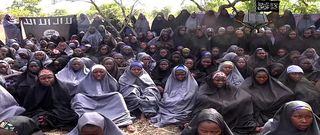Can Boko Haram Be Stopped?
After the tragic discovery of nearly 80 bodies in a mass grave in northern Nigeria, military forces from Niger, Chad and Cameroon vowed to destroy the Islamist group known as Boko Haram.
The radical extremist group began slaughtering Christians in 2009 with the intent to create a Muslim northern Nigeria, with a total death toll at 15,000. Other Christians have escaped into the south or neighboring countries. Many have suffered terrible losses and serious injuries through bomb blasts, burned buildings, or machetes blows.
 In April 2014, international outrage broke loose after Boko Haram raided a school in Chibok and abducted 276 girls, mostly Christians. After more than 12 months, hope is fading that the girls will ever be found alive. Hope that Boko Haram will be stopped after six years of bloodshed is also fading.
In April 2014, international outrage broke loose after Boko Haram raided a school in Chibok and abducted 276 girls, mostly Christians. After more than 12 months, hope is fading that the girls will ever be found alive. Hope that Boko Haram will be stopped after six years of bloodshed is also fading.
Nigeria’s military forces of have been widely criticized as being ineffective, and in many cases, absent altogether, leaving men, women and children to fend for themselves. In the town of Baga, civilians repeatedly warned local military of an impending attack, to no avail. When Boko Haram killed hundreds in that area in January 2015, Nigeria officials denied the numbers. However, witness accounts and satellite images showed devastating losses and the abysmal failure of the military to protect its own citizens.
However, political changes and a shift in military strategy suggest there is hope for Nigeria.
The African Union has authorized a multinational joint task force (MNJTF) between Benin, Chad, Cameroon, and Niger along with Nigeria to combat the Boko Haram militants. At the beginning of 2015, Boko Haram occupied nearly 20 local governments, an area about the size of West Virginia. Since then, military forces from Niger and Chad have pushed most of the insurgents out of the states of Yobe and Adamawa. Additionally, they are now making considerable progress toward recapturing areas of Borno state.
There is hope that the political atmosphere can change, and Nigeria’s citizens recently elected President Muhammadu Buhari, a Muslim. President-elect Buhari’s campaign centered on a reputation as a tough and knowledgeable military ruler. Christian leaders have publicly praised President Buhari as a man of peace.
One analyst argues that hope may be a long way off. Political pretense and even spiritual issues within the country may make it difficult to defeat Boko Haram on the battlefield alone. Though the Pew Research Center recently reported that 82% of Nigerians have an unfavorable view of Boko Haram, it is difficult to say whether or not having a very unfavorable view of this terrorist organization will create enough momentum to put them to a stop.
As someone who has watched and prayed anxiously since the Chibok girls were kidnapped, sometimes it can be hard to know how God is at work in the situation. However, as those in VOM’s leadership often remind us, God is not surprised by what is happening today. He is sovereign. He is an all-powerful God.
There is hope that Boko Haram can be put to a stop. There is always hope in God. And thanks be to God, who gives us the victory through our Lord Jesus Christ (1 Corinthians 15:57).
Ann Kay is a writer for VOM. She learned about VOM five years ago when she read Tortured for Christ and began receiving the newsletter. She is passionate about reaching the world for Christ and sharing stories of the persecuted church.